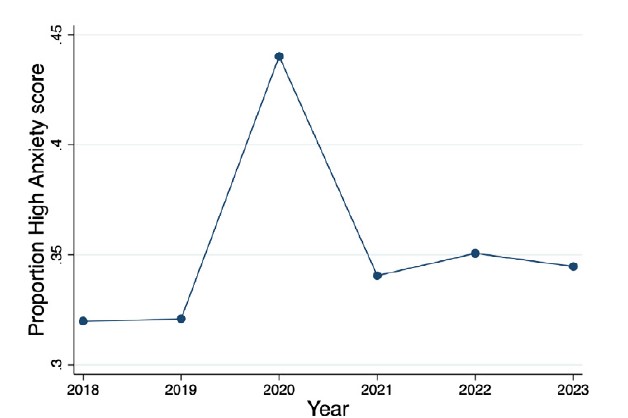An academic analysis of wellbeing data in the most-recent Civil Service People Survey has concluded that ministers should make enhancing officials' wellbeing a "clear priority" because departments are yet to fully return to pre-pandemic levels.
The Policy Institute and International School for Government at King’s College London looked at the four key wellbeing questions in the 2023 People Survey results – which the government published in March this year.
It found that no central government department had fewer than 30% of its staff reporting high anxiety. Up to 40% of officials at HM Treasury, the Department for Education and the Department for Science, Innovation and Technology said they experienced high anxiety.
Researchers noted that the wellbeing results in the 2023 People Survey were generally an improvement on 2022's survey responses – given against the backdrop of Boris Johnson's ousting as prime minister and Liz Truss' brief but turbulent spell as his successor.
Anxiety levels in the civil service rose hugely during the Covid-19 pandemic and fell significantly as the pandemic eased, but remain a couple of percentage points higher than pre-Covid levels across the workforce as a whole, as shown by the graph below.
 High-anxiety levels, as measured by the Civil Service People Survey. Image: KCL
High-anxiety levels, as measured by the Civil Service People Survey. Image: KCL
The KCL report described HM Revenue and Customs as the best-performing department in terms of its recovery to pre-pandemic wellbeing levels, as measured by the 2023 People Survey results. But even then King's College London's paper found anxiety among staff was higher than before Covid-19 struck.
The 22-page paper found the Department of Health and Social Care to be "among the worst performers" across the People Survey's suite of wellbeing measures, with life satisfaction seven percentage points lower than before the pandemic. High anxiety at the department was seven points above the level reported in 2019.
KCL's report said staff wellbeing data – as measured by officials' self-reported life satisfaction, happiness, anxiety, and sense of how worthwhile their life is – also appeared problematic at several other departments that are crucial to the new government's agenda.
It described DfE, the Ministry of Justice, the Ministry of Housing, Communities and Local Government, and parts of the Department for Energy Security and Net Zero as remaining "stubbornly and substantially worse off" in wellbeing terms than they were before the pandemic.
The report, written by International School for Government director Prof Michael Sanders and research associate Julia Ellingwood, acknowledged that wellbeing among officials in central government departments is "beginning to recover". It said 38 departments and agencies had uniformly positive changes to their wellbeing measures in 2023, compared with just 17 the previous year.
However the report finishes with a stark message to ministers. "The new government seeks to reform and revitalise public services, in an environment of considerable fiscal constraint," it says. "Their best resource for making this happen – the civil service – still remains behind pre-pandemic wellbeing levels on a number of measures. Enhancing the wellbeing of the service should be a clear priority."
A Cabinet Office spokesperson said: "We are committed to ensuring that the civil service is a fulfilling and rewarding career and that all civil servants feel supported."
The department pointed to commitments on staff health and wellbeing in the Civil Service People Plan 2024-27 and to the occupational health and employee-assistance services that organisations have in place.